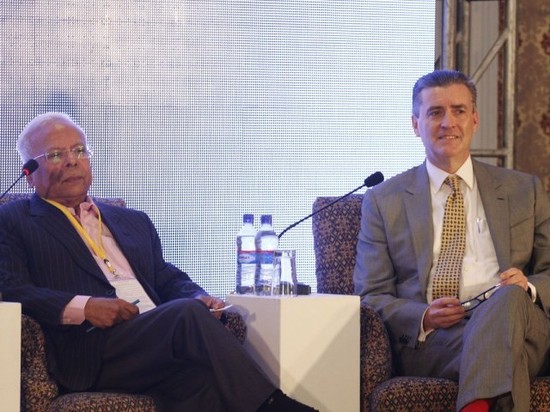One question that has captivated a large chunk of Pakistan's majority is -- what will happen post 2014 when U.S. forces in Afghanistan will be withdrawn? People of Pakistan are dubious about their nation's future.
What will U.S.'s stance be towards one of its major allies in the war against terror, once it is no longer needed to serve the global power?
Who knew these issues would be answered by none other than the U.S. ambassador to Pakistan himself, at the 5th Karachi Literature Festival held recently at one of the metropolis' uber classy, Beach Luxury Hotel.
Richard Olson, the U.S. ambassador to Pakistan's arrival at the event was unrevealed, until the session in which he was the chief guest, commenced.
The moderator of the event was Ishrat Hussain, former Governor of the State Bank of Pakistan.
The U.S. has considered an Af-Pak relationship- the public of Pakistan wants to know what the equation would be like when 'Af' will no longer be tied to 'Pak'. How will the U.S. treat Pakistan post 2014 was Mr. Hussain's first question to the ambassador.
Olson reassured those present in the session that U.S.-Pak relations will endure even after the troops are withdrawn.
"We do not want 2014 to be a repeat of 1989," reminisced the ambassador. "Yes, we have made mistakes in the past," he continued.
Security concerns are emanating in the minds of countries neighbouring Afghanistan. According to Mr. Olson, the current Afghan army compsists of about 352,000 well trained soldiers.
Not only is the army strong enough, but the economic commitments that have been made by the international committees such as the Tokyo Conference, will certainly help bring stability in the country which will eventually spread its wings in the south Asian region.
"We do not want competition between neighbouring states," remarked the ambassador.Olson assured the audience present, "the U.S. would always want its relationship with Pakistan to be independent.
The U.S. is known for spending heavy sums of money on the developing world. According to Olson, U.S. $3 billion are allotted to four disparate categories which include,
• Kerry-Lugar Bill• Health and education• Security assistance that includes military equipment and training• Coalition Support Fund
The moderator of the event brought up a common concern to his counterpart's knowledge -- trade. Mr. Hussain emphasized that majority of the public in Pakistan is of the opinion that U.S. spends exorbitant sums of money to fulfill its strategic interests. The point Hussain was trying to highlight was; why couldn't the world super power opt for a different strategy?
If the U.S. builds strong trading ties, this can increase job opportunities for the people living here and can result in high pay-offs.
The government of Pakistan's slogan being: 'We want trade -- not aid' was reiterated by Olson. "I agree it (trade) is important and we are one of the top investors in Pakistan along with China."
"Our acknowledgement with regard to Pakistan's sacrifices (in the war on terror) is beyond words," the recently appointed U.S. ambassador stated. "With ups and downs, we're trying everything to improve relations post 2014 that will bring regional stability," he continued.
As for the Pak-Iran pipeline, what Olson had to say was "it is not just us, but the security council members have concerns regarding Iran," in reply to a question posed by a member from the audience.
Holding on to all the positivity, let us hope post 2014 U.S.-Pakistan relationship does endure.
